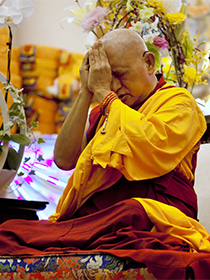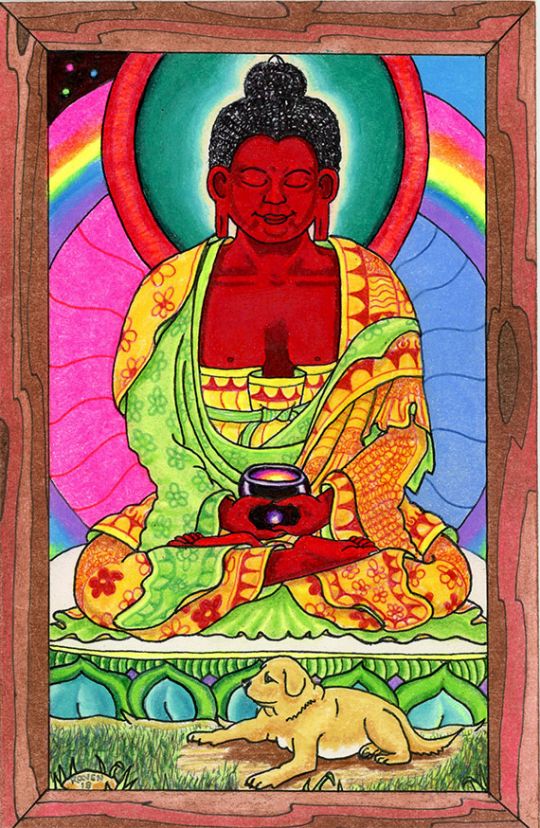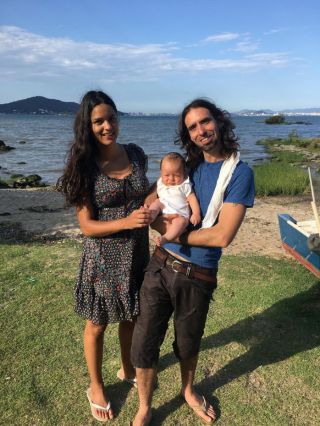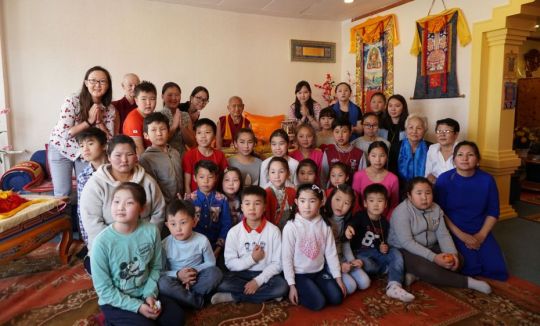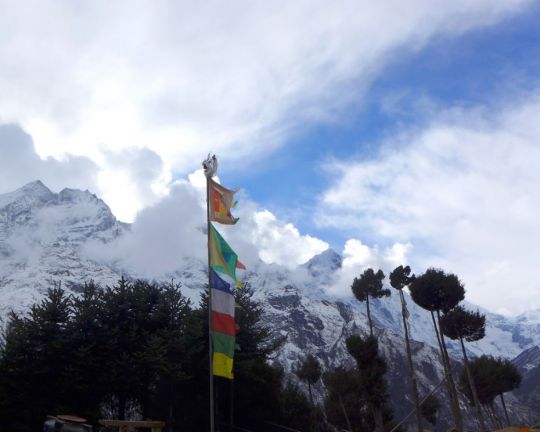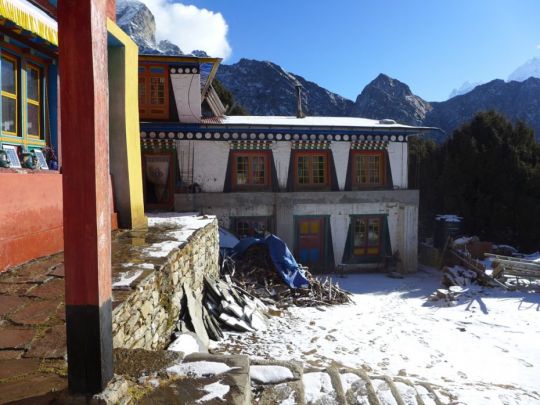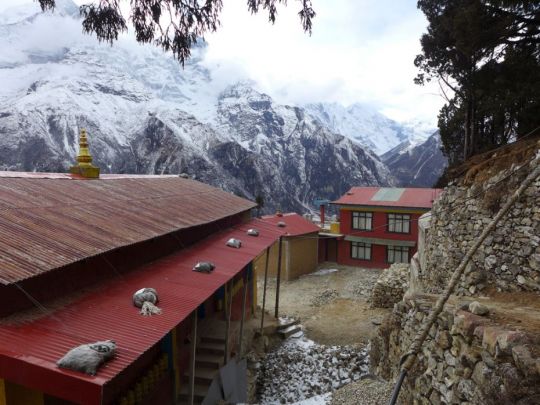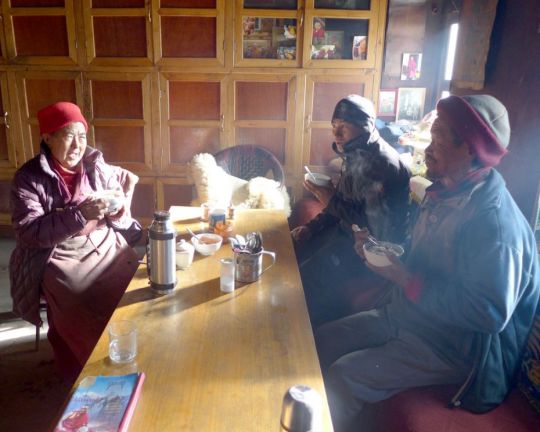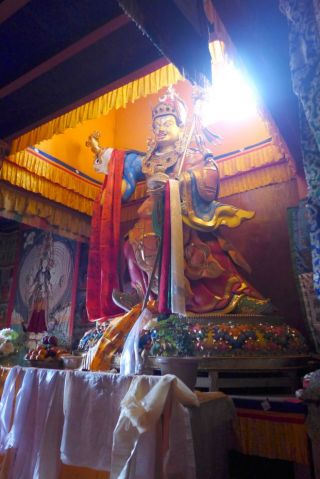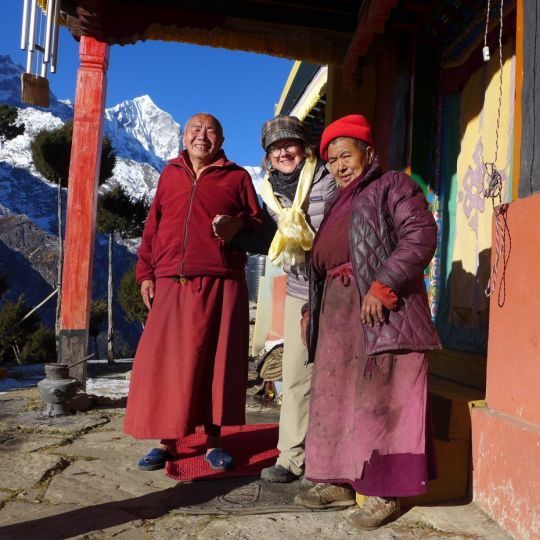- Home
- FPMT Homepage
Foundation for the Preservation of the Mahayana Tradition
The FPMT is an organization devoted to preserving and spreading Mahayana Buddhism worldwide by creating opportunities to listen, reflect, meditate, practice and actualize the unmistaken teachings of the Buddha and based on that experience spreading the Dharma to sentient beings. We provide integrated education through which people’s minds and hearts can be transformed into their highest potential for the benefit of others, inspired by an attitude of universal responsibility and service. We are committed to creating harmonious environments and helping all beings develop their full potential of infinite wisdom and compassion. Our organization is based on the Buddhist tradition of Lama Tsongkhapa of Tibet as taught to us by our founders Lama Thubten Yeshe and Lama Thubten Zopa Rinpoche.
- Willkommen
Die Stiftung zur Erhaltung der Mahayana Tradition (FPMT) ist eine Organisation, die sich weltweit für die Erhaltung und Verbreitung des Mahayana-Buddhismus einsetzt, indem sie Möglichkeiten schafft, den makellosen Lehren des Buddha zuzuhören, über sie zur reflektieren und zu meditieren und auf der Grundlage dieser Erfahrung das Dharma unter den Lebewesen zu verbreiten.
Wir bieten integrierte Schulungswege an, durch denen der Geist und das Herz der Menschen in ihr höchstes Potential verwandelt werden zum Wohl der anderen – inspiriert durch eine Haltung der universellen Verantwortung und dem Wunsch zu dienen. Wir haben uns verpflichtet, harmonische Umgebungen zu schaffen und allen Wesen zu helfen, ihr volles Potenzial unendlicher Weisheit und grenzenlosen Mitgefühls zu verwirklichen.
Unsere Organisation basiert auf der buddhistischen Tradition von Lama Tsongkhapa von Tibet, so wie sie uns von unseren Gründern Lama Thubten Yeshe und Lama Thubten Zopa Rinpoche gelehrt wird.
- Bienvenidos
La Fundación para la preservación de la tradición Mahayana (FPMT) es una organización que se dedica a preservar y difundir el budismo Mahayana en todo el mundo, creando oportunidades para escuchar, reflexionar, meditar, practicar y actualizar las enseñanzas inconfundibles de Buda y en base a esa experiencia difundir el Dharma a los seres.
Proporcionamos una educación integrada a través de la cual las mentes y los corazones de las personas se pueden transformar en su mayor potencial para el beneficio de los demás, inspirados por una actitud de responsabilidad y servicio universales. Estamos comprometidos a crear ambientes armoniosos y ayudar a todos los seres a desarrollar todo su potencial de infinita sabiduría y compasión.
Nuestra organización se basa en la tradición budista de Lama Tsongkhapa del Tíbet como nos lo enseñaron nuestros fundadores Lama Thubten Yeshe y Lama Zopa Rinpoche.
A continuación puede ver una lista de los centros y sus páginas web en su lengua preferida.
- Bienvenue
L’organisation de la FPMT a pour vocation la préservation et la diffusion du bouddhisme du mahayana dans le monde entier. Elle offre l’opportunité d’écouter, de réfléchir, de méditer, de pratiquer et de réaliser les enseignements excellents du Bouddha, pour ensuite transmettre le Dharma à tous les êtres. Nous proposons une formation intégrée grâce à laquelle le cœur et l’esprit de chacun peuvent accomplir leur potentiel le plus élevé pour le bien d’autrui, inspirés par le sens du service et une responsabilité universelle. Nous nous engageons à créer un environnement harmonieux et à aider tous les êtres à épanouir leur potentiel illimité de compassion et de sagesse. Notre organisation s’appuie sur la tradition guéloukpa de Lama Tsongkhapa du Tibet, telle qu’elle a été enseignée par nos fondateurs Lama Thoubtèn Yéshé et Lama Zopa Rinpoché.
Visitez le site de notre Editions Mahayana pour les traductions, conseils et nouvelles du Bureau international en français.
Voici une liste de centres et de leurs sites dans votre langue préférée
- Benvenuto
L’FPMT è un organizzazione il cui scopo è preservare e diffondere il Buddhismo Mahayana nel mondo, creando occasioni di ascolto, riflessione, meditazione e pratica dei perfetti insegnamenti del Buddha, al fine di attualizzare e diffondere il Dharma fra tutti gli esseri senzienti.
Offriamo un’educazione integrata, che può trasformare la mente e i cuori delle persone nel loro massimo potenziale, per il beneficio di tutti gli esseri, ispirati da un’attitudine di responsabilità universale e di servizio.
Il nostro obiettivo è quello di creare contesti armoniosi e aiutare tutti gli esseri a sviluppare in modo completo le proprie potenzialità di infinita saggezza e compassione.
La nostra organizzazione si basa sulla tradizione buddhista di Lama Tsongkhapa del Tibet, così come ci è stata insegnata dai nostri fondatori Lama Thubten Yeshe e Lama Zopa Rinpoche.
Di seguito potete trovare un elenco dei centri e dei loro siti nella lingua da voi prescelta.
- 欢迎 / 歡迎
简体中文
“护持大乘法脉基金会”( 英文简称:FPMT。全名:Foundation for the Preservation of the Mahayana Tradition) 是一个致力于护持和弘扬大乘佛法的国际佛教组织。我们提供听闻,思维,禅修,修行和实证佛陀无误教法的机会,以便让一切众生都能够享受佛法的指引和滋润。
我们全力创造和谐融洽的环境, 为人们提供解行并重的完整佛法教育,以便启发内在的环宇悲心及责任心,并开发内心所蕴藏的巨大潜能 — 无限的智慧与悲心 — 以便利益和服务一切有情。
FPMT的创办人是图腾耶喜喇嘛和喇嘛梭巴仁波切。我们所修习的是由两位上师所教导的,西藏喀巴大师的佛法传承。
繁體中文
護持大乘法脈基金會”( 英文簡稱:FPMT。全名:Found
ation for the Preservation of the Mahayana Tradition ) 是一個致力於護持和弘揚大乘佛法的國際佛教組織。我們提供聽聞, 思維,禪修,修行和實證佛陀無誤教法的機會,以便讓一切眾生都能 夠享受佛法的指引和滋潤。 我們全力創造和諧融洽的環境,
為人們提供解行並重的完整佛法教育,以便啟發內在的環宇悲心及責 任心,並開發內心所蘊藏的巨大潛能 — 無限的智慧與悲心 – – 以便利益和服務一切有情。 FPMT的創辦人是圖騰耶喜喇嘛和喇嘛梭巴仁波切。
我們所修習的是由兩位上師所教導的,西藏喀巴大師的佛法傳承。 察看道场信息:
- FPMT Homepage
- News/Media
-
- Study & Practice
-
-
- About FPMT Education Services
- Latest News
- Programs
- New to Buddhism?
- Buddhist Mind Science: Activating Your Potential
- Heart Advice for Death and Dying
- Discovering Buddhism
- Living in the Path
- Exploring Buddhism
- FPMT Basic Program
- FPMT Masters Program
- FPMT In-Depth Meditation Training
- Maitripa College
- Lotsawa Rinchen Zangpo Translator Program
- Universal Education for Compassion & Wisdom
- Online Learning Center
-
- Prayers & Practice Materials
- Overview of Prayers & Practices
- Full Catalogue of Prayers & Practice Materials
- Explore Popular Topics
- Benefiting Animals
- Chenrezig Resources
- Death & Dying Resources
- Lama Chopa (Guru Puja)
- Lama Zopa Rinpoche: Compendium of Precious Instructions
- Lama Zopa Rinpoche: Life Practice Advice
- Lama Zopa Rinpoche Practice Series
- Lamrim Resources
- Mantras
- Prayer Book Updates
- Purification Practices
- Sutras
- Thought Transformation (Lojong)
- Audio Materials
- Dharma Dates - Tibetan Calendar
- Translation Services
- Publishing Services
- Ways to Offer Support
- Prayers & Practice Materials
-
- Teachings and Advice
- Find Teachings and Advice
- Lama Zopa Rinpoche Advice Page
- Lama Zopa Rinpoche: Compendium of Precious Instructions
- Lama Zopa Rinpoche Video Teachings
- ༧སྐྱབས་རྗེ་བཟོད་པ་རིན་པོ་ཆེ་མཆོག་ནས་སྩལ་བའི་བཀའ་སློབ་བརྙན་འཕྲིན།
- Podcasts
- Lama Yeshe Wisdom Archive
- Buddhism FAQ
- Dharma for Young People
- Resources on Holy Objects
- Teachings and Advice
-
-
*If a menu item has a submenu clicking once will expand the menu clicking twice will open the page.
-
-
- Centers
-
- Teachers
-
- Projects
-
-
-
-
*If a menu item has a submenu clicking once will expand the menu clicking twice will open the page.
-
-
- FPMT
-
-
-
-
-
Superficial observation of the sense world might lead you to believe that people’s problems are different, but if you check more deeply, you will see that fundamentally, they are the same. What makes people’s problems appear unique is their different interpretation of their experiences.
Lama Thubten Yeshe
-
-
-
- Shop
-
-
-
The Foundation Store is FPMT’s online shop and features a vast selection of Buddhist study and practice materials written or recommended by our lineage gurus. These items include homestudy programs, prayers and practices in PDF or eBook format, materials for children, and other resources to support practitioners.
Items displayed in the shop are made available for Dharma practice and educational purposes, and never for the purpose of profiting from their sale. Please read FPMT Foundation Store Policy Regarding Dharma Items for more information.
-
-
FPMT Community: Stories & News
21
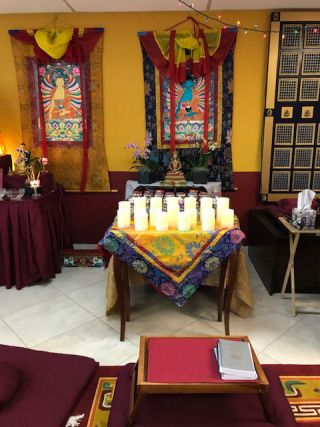
Practice in the wake of the school shooting in Parkland, Florida, Thubten Kunga Center, Deerfield Beach, Florida, US, February 2018. Photo by Martha Lucia Gonzalez.
On the afternoon of February 14, a mass shooting occurred at Marjory Stoneman Douglas High School, in Parkland, Florida, US. Fourteen students and three teachers were killed. A further fourteen people were wounded.
In the days after the shooting, Thubten Kunga Center, an FPMT center located near the tragedy, held a Medicine Buddha puja and read the “King of Prayers,” which is often recited to benefit those who have recently died.
Practitioners at the center lit a total of eighteen candles: one for each of the victims and one for the young man that carried out the shooting.
Lama Zopa Rinpoche always advises to make strong prayers to Medicine Buddha for anyone who is dying, sick, injured, or who has already died from violence such as that which occurred in Florida or elsewhere.
The short mantra of Medicine Buddha is:
TADYATHĀ / OṂ BHAIṢHAJYE BHAIṢHAJYE / MAHĀBHAIṢHAJYE [BHAIṢHAJYE] /
RĀJA SAMUDGATE SVĀHĀ
Find the long and short Medicine Buddha mantras with their common pronunciations on FPMT.org.
Read The Benefits of Medicine Buddha Mantra and Practice by Lama Zopa Rinpoche.
Mandala brings you news of Lama Zopa Rinpoche and of activities, teachings and events from over 160 FPMT centers, projects and services around the globe. If you like what you read on Mandala, consider becoming a Friend of FPMT, which supports our work.
15
Losar Tashi Delek!
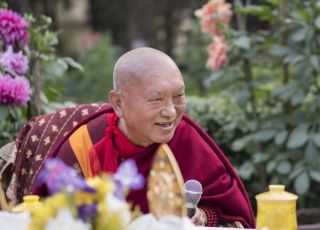
Lama Zopa Rinpoche during Root Institute’s 30th anniversary celebration, India, January 2018. Photo by Ven. Lobsang Sherab.
All good wishes for Losar (Tibetan New Year) to you, from Lama Zopa Rinpoche and all at FPMT International Office.
Our Losar greetings are part of the February FPMT International Office e-News.
In addition to our Losar message, we invite you to enjoy:
- Updates to Lama Zopa Rinpoche’s Schedule
- How we can keep you updated daily!
- Why it’s time to empty your Merit Box
- News about Foundation Service Seminars in Spanish
and more…..
The FPMT International Office News comes from your FPMT International Office. Visit our subscribe page to receive the FPMT International Office News directly in your email box.
13
Currently a prisoner at Idaho Correctional Institution-Orofino (ICIO) in the United States, Raven Jones has been sharing his print copies of Mandala with fellow inmates. This small group of Dharma students recently offered two Losar (Tibetan new year) cards to FPMT in celebration of the year of the Earth Dog 2145. One was sent directly to Lama Zopa Rinpoche and the other to Mandala. This year, Losar takes place on February 16.
Along with the card to Mandala came a note of gratitude, containing the mantra of Amitabha:
Thank you so very much for all you do!!! So, during this year of the Earth Dog, have a great New Year! Losar Tashi Delek! OM AMI DEWA HRI!
Raven Jones holds the unique distinction of being the only FPMT Masters Program student to complete the six-year study program entirely from prison.
Learn more about the work of the Liberation Prison Project, an FPMT project that supports Dharma students in prison, on FPMT.org.
Read a full interview with Raven Jones in “Liberation through Education,” part of the Mandala October-December 2014 issue.
Mandala brings you news of Lama Zopa Rinpoche and of activities, teachings and events from nearly 160 FPMT centers, projects and services around the globe. If you like what you read on Mandala, consider becoming a Friend of FPMT, which supports our work.
- Tagged: liberation prison project, losar, masters program, raven jones
11
Happy 33rd Birthday, Tenzin Ösel Hita!
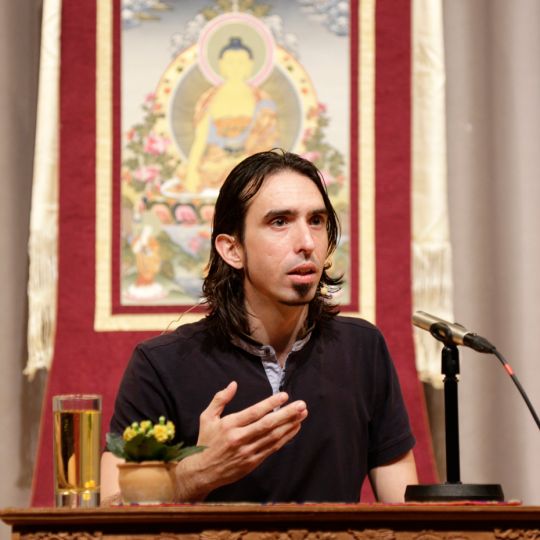
Tenzin Ösel Hita giving a talk at Aryatara Institute, Germany, February 2017. Photo by Hermann Wittekopf.
The international FPMT family wishes Tenzin Ösel Hita a very happy birthday and a long, healthy life. May his beneficial activities flourish and wishes come instantly into fruition!
Tenzin Ösel Hita, the recognized reincarnation of FPMT founder Lama Yeshe, turns 33 on February 12, 2018.
Ösel’s 32nd year was a full one. In addition to giving talks at eleven European FPMT centers and one Brazilian center, Ösel and his partner Indila Dora welcomed their son, Tenzin Norbu, into the world!
The Big Love Fund provides financial resources that enable Ösel to continue his endeavors on behalf of FPMT.
You can follow news and updates about Ösel on the Tenzin Ösel Hita news feed. Find recordings of talks by Ösel on the Tenzin Ösel Hita Videos page.
- Tagged: big love fund, tenzin osel hita
7
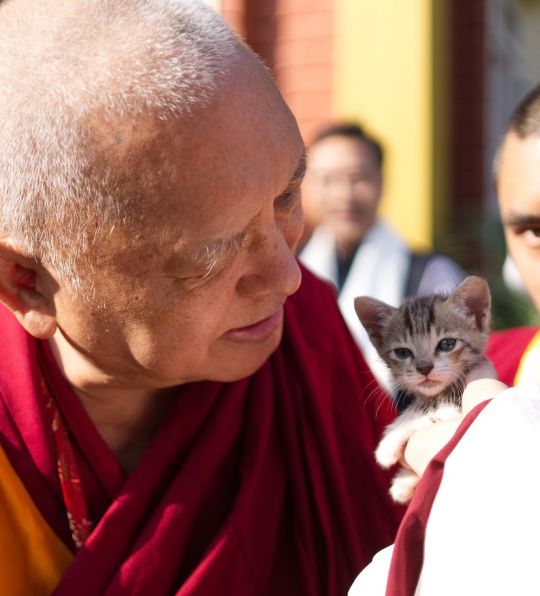
Lama Zopa Rinpoche blessing a small kitten before leaving Sera Je Monastery, Bylakuppe, India, November 2017. Photo by Ven. Lobsang Sherab.
Lama Zopa Rinpoche traveled to Sera Je Monastic University in South India in November 2017. Ven. Gyalten Lekden, an International Mahayana Institute (IMI) monk who is in the geshe studies program at Sera Je, shared this report of Rinpoche’s visit:
After a few years’ hiatus, we were blessed to welcome Lama Zopa Rinpoche back to Sera Je in November 2017. Rinpoche had begun a series of oral transmissions some years ago, transmissions of a five-volume collection of texts and practices related to the lineage of Most Secret Hayagriva that serves as the protector of Sera Je Monastery. As is Rinpoche’s inimitable style, he tailored his teachings to meet the needs of the attendees. There was a strong emphasis on mind-training as well as the importance of distinguishing Dharma from non-Dharma through recognizing and working to abandon the eight worldly dharmas. Since the audience was composed primarily of monks, Rinpoche also wove in the benefits of properly holding the monastic vows, and how serving the monastery is just as important as traditional study.
Everyone present was overjoyed and grateful to be able to have Rinpoche pierce through the dark clouds of our habitual misconceptions, and lay bare what is most important for our lives. Then, serving as a constant paradigm for those of us who desperately need the cooling camphor of Rinpoche’s blessed instruction to quell the blazing flames of our self-grasping, self-cherishing minds, Rinpoche announced that he was donating all of the offerings he had received during the teaching to Sera Monastery’s construction of a new sewage draining system and sidewalk on the main road leading into the monastery.
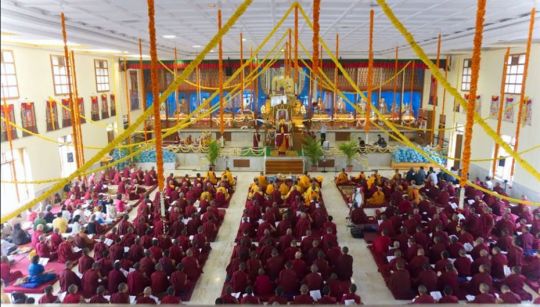
Long life puja offered to Lama Zopa Rinpoche at Drati Khangtsen, Sera Je Monastery, Bylakuppe, India, December 2017. Photo by Ven. Lobsang Sherab.
As always, while at Sera Je, Rinpoche did not ever take a break. He was in constant meetings with various monastery officials, lamas, revered guests, and devotees, demonstrating for us an impeccable model of ceaseless vigilance in working to support and benefit others. Sera Je IMI House requested Rinpoche visit, and they invited me and the other foreign monks, as well as all of the out-of-town guests, to join. During his already busy schedule, he took time to not only grant us the blessing of his holy presence at IMI House, but he also stayed for quite a while and offered excellent and practical advice to those who had gathered.
As this year’s teachings concluded, while hosting the other members of the organizing committee and me for lunch, Rinpoche began to discuss teachings for future years. He is committed to completing the transmission, but he also sees the benefit of offering practical instruction to the monks. He also shared plans on how he wishes to continue combining those two aspects of instruction.
It is important to express a quick word of gratitude to Drati Khangtsen, and its tireless community of monks, without whom these teachings would not ever be possible. They did all the work of cleaning and preparing the temple, serving the tea, and helping prepare and serve meals to all of the guests, and so forth. Although this year’s schedule was quite short, everyone was ecstatic to be able to be satiated by Rinpoche’s nectar-like speech and advice. We anxiously await his return in 2018.
View a gallery of images taken during Lama Zopa Rinpoche’s visit to Sera Je Monastery in November 2017.
More information, photos, and updates about FPMT spiritual director Lama Zopa Rinpoche can be found on Rinpoche’s webpage on FPMT.org. If you’d like to receive news of Lama Zopa Rinpoche and FPMT via email, sign up to FPMT News.
- Tagged: lama zopa rinpoche, sera je monastery
31
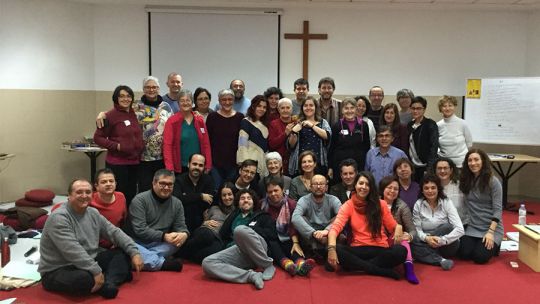
Attendees of the Foundation Service Seminar near Madrid, Spain, December 2017. Photo courtesy of Paloma Fernandez.
In December 2017, a Foundation Service Seminar (FSS) was held near Madrid. Organized and facilitated by Spain national coordinator Paloma Fernandez and senior facilitator and center director François Lecointre, this was the first FSS to be held entirely in Spanish. Paloma shares news from the event:
Last December, we had our first Foundation Service Seminar in Spain, the first time that the seminar has been done in Spanish.
Thirty-eight people came from many different parts of Spain, and one person traveled all the way from London, to participate in the event. People arrived by all means: planes, trains, and buses. Many of them used five vacation days to attend this seminar and dedicate their time to the FPMT and Lama Zopa Rinpoche.
François Lecointre, a senior FSS registered facilitator and director of Institut Vajra Yogini, offered his time, his experience, his knowledge, his kindness, and love to all the participants. (And to me, as I was co-facilitating the seminar for the first time!)
We started every day after breakfast. Each day offered different learning activities, which typically ran until 10 p.m. each night. It was a quite intense schedule, but nobody complained. It was a great experience!
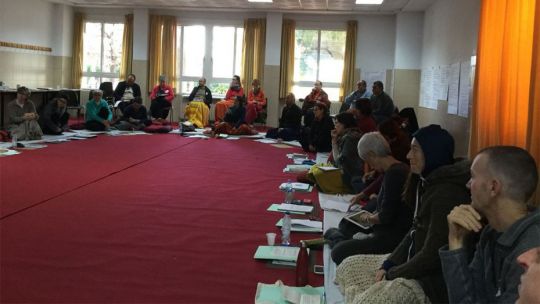
A group activity during the Foundation Service Seminar near Madrid, Spain, December 2017. Photo courtesy of Paloma Fernandez.
We all worked with great focus, analyzing different aspects of our service. We had people from nine different centers, one study group, one community project, and one from Universal Education. It was very enriching to have so many different experiences and points of view to share and to learn from.
As well as the dynamic group exercises, we also had a number of beautiful meditations, great presentations, and very stimulating discussions. We also watched very inspiring videos from Lama Zopa Rinpoche, Lama Yeshe, and Tenzin Ösel Hita.
The main highlight for most of us was, as Lama Yeshe used to say, the “family feeling” that was present during all the seminars. It was so great to be able to share five days and nights with the FPMT family and to experience what it means to be the “ambassadors” of His Holiness the Dalai Lama and Lama Zopa Rinpoche.
One question that came from many participants was: “When is the next one?” So I have the feeling that this is the sign that the first FSS in Spain was a great success!
Foundation Service Seminar events are happening this year in Mexico in early February; at Jamyang Buddhist Centre, UK, in August; and at Milarepa Center, USA, in September. For more information on the Foundation Service Seminar and to find out how to register for future events, visit the FPMT Service Seminar webpage.
Mandala brings you news of Lama Zopa Rinpoche and of activities, teachings and events from nearly 160 FPMT centers, projects and services around the globe. If you like what you read on Mandala, consider becoming a Friend of FPMT, which supports our work.
24
The Mahayana Children’s Programme, a program of FPMT Mongolia, is now celebrating its tenth anniversary. To mark the occasion, FPMT Mongolia director Ianzinha Bartanova shared a video of the children, recorded in Ulaanbaatar, the nation’s capital. Ianzinha writes the following about the video and the Mahayana Children’s Programme:
In the video below the youngest group of the Mahayana Children’s Programme participants, ranging in age from six to eight years, happily recite mantras in Mongolian and dedicate all merit from their practice to Lama Zopa Rinpoche’s long life.
Before they commence the mantra recitation, the children generate the correct motivation as follows: “I will do these recitations in order to be beneficial to my country, and all the six-realm sentient beings, and for my family, and myself to be happy, and to have good qualities such as perseverance, patience, responsibility, and friendliness.”
Currently practicing memorization, the children wholeheartedly enjoy the recitation of the following mantras and prayers: Guru Shakyamuni Buddha, Chenrezig, Manjushri, Vajrapani, the prostration mantra, Tara, Medicine Buddha, Vajrasattva, the mantra to bless offerings, and Migtsema.
As the children have a deep appreciation for the importance of dedication in practice, they concluded with these wishes: “Due to these merits collected, may I and my family be happy! May the most precious and kind Lama Zopa Rinpoche have a long and healthy life, and may Rinpoche lead us in all future lives!”
On behalf of all FPMT Mongolia staff and students, we would like to join with the children and dedicate all our merits accumulated during 2017 for Rinpoche’s long, healthy, and stable life. We rejoice in all meritorious actions done by the FPMT family, and from the bottom of our hearts, we wish you all a very happy and prosperous new year!
Learn more about the work of FPMT in Mongolia: http://www.fpmtmongolia.org
Learn more about the Mahayana Children’s Programme:
http://www.fpmtmongolia.org/mahayana-childrens-programme
FPMT.org and Mandala Publications brings you news of Lama Zopa Rinpoche and of activities, teachings and events from over 160 FPMT centers, projects and services around the globe. If you like what you read, consider becoming a Friend of FPMT, which supports our work.
- Tagged: fpmt mongolia, mahayana childrens program
19
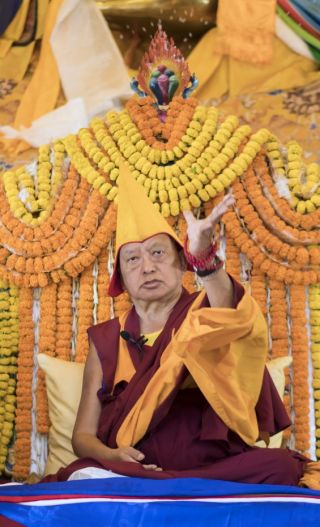
Lama Zopa Rinpoche during the official long life puja offered at Kopan Monastery, Nepal, December 14, 2017. Photo by Ven. Lobsang Sherab.
We invite you to enjoy our January e-News.
This month we bring you:
- How to Report your Recitations for Lama Zopa Rinpoche’s Health
- Rejoicing in Another Year of Charitable Giving
- Two New Stories from Mandala magazine
- Two New FPMT Study Groups
… and more, with lots of lovely photos!
The FPMT International Office News comes from your FPMT International Office. Visit our subscribe page to receive the FPMT International Office News directly in your email box.
17
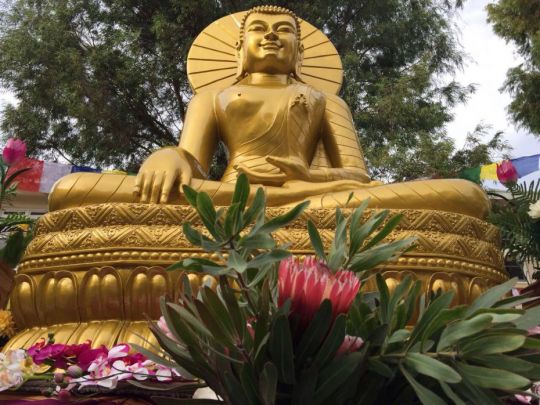
Buddha statue prior to offering gold-leaf at the Guru bumtsog, Hobart, Tasmania, June 2016. Photo courtesy of Stephanie Brennan.
In June 2017, FPMT in Australia (FPMTA) and Chag Tong Chen Tong Tibetan Buddhist Centre (CTCT) organized 100,000 tsog offerings to Guru Rinpoche, also known as a “Guru bumtsog.” More than 160 students from twenty or so Australian FPMT centers, projects, and services traveled to Hobart, Tasmania, to take part in the powerful and joyous multi-day event.
In a new Mandala online feature, “The Power of Guru Rinpoche: The Heart-Opening Guru Bumtsog Experience,” Stephanie Brennan, FPMTA National Education/Tour Coordinator, shares her personal account of the Guru bumtsog experience.
“… After chai and cake were served, the first puja session began. With eighteen Sangha present from all over Australia, the gompa was filled with maroon and saffron robes. Sitting in front were two geshes—Geshe Tenzin Zopa, who led the puja, and Geshe Phuntsok Tsultrim, the resident geshe at Chenrezig Institute, Queensland. Also in front was Lama Jimay from Tasmania, who ably assisted with the hook drum,” Stephanie writes.
“In the first session, we started by chanting the full verses of the ‘Prayer to Guru Rinpoche That Spontaneously Fulfills All Wishes’ to a poignant and melodic tune. This was followed by the tsog offering prayer and Guru Rinpoche mantra, which were repeated many times. These repetitions were accompanied by cymbals and drums with a very stirring beat. As the pace of these repetitions was fast, it took a little while for everyone to get their head around the Tibetan syllables, but soon everyone settled into a kind of rhythm, with Geshe Tenzin Zopa’s clear voice leading us forward.
“Sangha members played the ritual instruments, and the gompa became warm and energized. As I looked at the large thangka of Guru Rinpoche above the tsog offerings, it felt to me that evoking the spirit of Guru Rinpoche and knowing that this puja had been blessed by Lama Zopa Rinpoche beforehand, particularly to clear obstacles, made everything in the gompa seem timeless, vivid, and very clear. …”
Read Stephanie Brennan’s article “The Power of Guru Rinpoche: The Heart-Opening Australian Guru Bumtsog Experience” in its entirety:
https://fpmt.org/mandala/in-depth-stories/the-power-of-guru-rinpoche-the-heart-opening-australian-guru-bumtsog-experience
FPMT.org and Mandala Publications brings you news of Lama Zopa Rinpoche and of activities, teachings, and events from over 160 FPMT centers, projects and services around the globe. If you like what you read, consider becoming a Friend of FPMT, which supports our work.
10
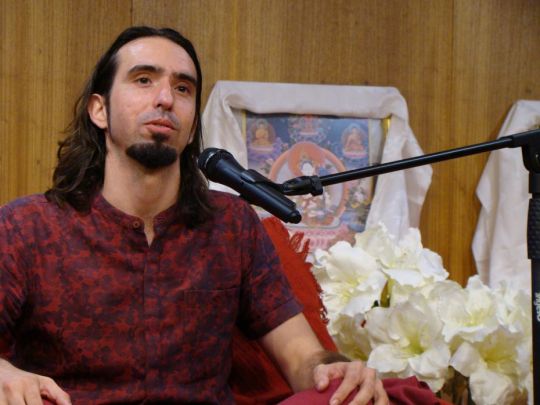
Tenzin Ösel Hita giving a talk at Centro Shiwa Lha, Rio de Janeiro, Brazil, September 2017. Photo courtesy of Centro Shiwa Lha.
Tenzin Ösel Hita, the recognized reincarnation of FPMT founder Lama Yeshe, gave a talk at Centro Shiwa Lha in Rio de Janeiro in Brazil in September 2017. (At the beginning of 2017, Ösel toured European FPMT centers giving talks to hundreds of Dharma students.) Neyl Soares, director of Centro Shiwa Lha shared this update from Ösel’s visit:
Recently renovated and opened just six months ago, the building that houses Centro Shiwa Lha is a historic 19th-century house. Due to construction work, the center’s teaching and events calendar has been a work in progress. But a benefit of the remodeling process is that all activities can now be accommodated more comfortably in the new meditation and talks room, which has a capacity of up to sixty people. Upstairs in the building are guest teacher accommodations and outside there is a small yard with a guava tree and two papaya trees.
When we learned of Ösel Hita Torres coming to Brazil, we hurried to invite him for an informal visit and a talk. As we prepared for the talk, we were surprised to see that the projected audience numbers had quickly surpassed our permitted capacity. So, we moved the venue to a conference room in the neighborhood that would accommodate a large crowd.
While preparing the hired conference room, we noticed that there were resources to broadcast Ösel’s talk live to several FPMT centers, Facebook pages, and other social media platforms. To help in our desired broadcast of the talk, FPMT International Office put us in touch with Alexis Benelhadj, IT manager at Istitut Vajra Yogini in France. Alexis provided access to a streaming server, which allowed us to stream video to many destinations—our Facebook page and YouTube channel, the Lama Yeshe Wisdom Archive page, and Ösel’s own website—allowing us to reach even more people than we had initially imagined possible. The streaming connected people in various parts of the planet, benefiting many people.
Ösel arrived a couple of days in advance of his scheduled talk, so we had the chance to show him some of the sights and sounds of Rio.
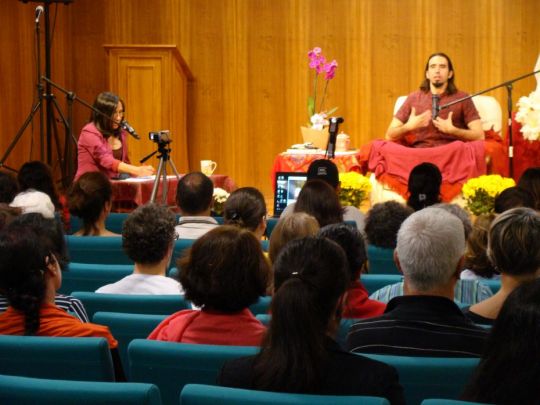
Tenzin Ösel Hita giving a talk at Centro Shiwa Lha, Rio de Janeiro, Brazil, September 2017. Photo courtesy of Centro Shiwa Lha.
During the event, the venue was packed with people of various ages and from different Dharma communities, all curious to listen Ösel talk. He was surprised by the number of people in attendance who were able to understand Spanish, but promised that since now he lives in Brazil, his next talk would be without translation.
After warming up the audience with a meditation focused on breathing and prayers, Ösel was clearly at ease. He quickly dismissed his notes and conducted the talk as if seated in the living room with family. Mostly the talk was in English with translation for the Brazilian attendees, but Ösel also used Spanish and a little Portuguese to clarify a number of points.
Overall, a highly successful event was delivered with lightness, and a keen spirit, which has resulted in giving us a sense of preparedness for the new season, and encourages us to engage in future responsibilities.
During his talk Ösel revealed that now he will live in Curitiba, southern Brazil, with his wife, who at the time was pregnant and expecting in one or two weeks. He told us that Centro Shiwa Lha will be his home in Rio de Janeiro. And baby Tenzin Norbu arrived within days!
Congratulations on your new baby, Indila and Ösel! ¡Enhorabuena por el bebé nuevo! Bem-vindo, Tenzin Norbu! May many benefit!
Watch Tenzi Ösel Hita talk at Centro Shiwa Lha in Rio de Janeiro:
https://www.youtube.com/Z3sC9Y-7uco
Find more information about Tenzin Ösel Hita on his resource page on FPMT.org, including news, photos, videos, and links to his official Facebook page:
https://fpmt.org/fpmt/osel/
Learn more about Centro Shiwa Lha in Rio de Janeiro.
The Big Love Fund provides financial resources that enable Tenzin Ösel Hita to continue his endeavors on behalf of FPMT.
- Tagged: brazil, centro shiwa lha, tenzin osel hita
3
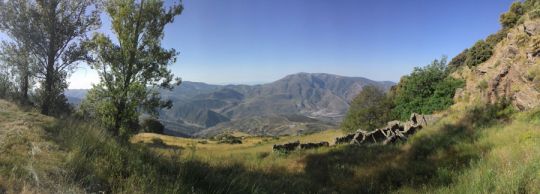
Mountain view from Oseling Retreat Center, October 2017. Photo courtesy of Oseling Retreat Center.
Oseling Retreat Center, in the Andalusia region of Spain, has undertaken a new project. In response to advice from Lama Zopa Rinpoche, the center has begun work on the planning, construction, and fund-raising aspects for a new nunnery that will provide a home and learning facility for European nuns. Center director Anne Wenaas describes the project for Mandala:
Lama Zopa Rinpoche advised Oseling Retreat Center in Spain to establish a nunnery within its grounds. In keeping with Rinpoche’s vision, construction has recently commenced on a project that promises to provide a “powerhouse of Dharma practice” for European nuns.
It is of great importance for all the nuns to have a place to live, so that they can observe a monastic life and dedicate their lives to study, contemplation, and meditation. The living costs for each nun will be very low, only food and maintenance will be needed.
Oseling is situated in the Sierra Nevada, a mountain range about forty kilometers (twenty-five miles) from the coast and within traveling distance of the city of Granada. The center is quite high up the mountains, forming a large portion of the top of a mountain within the National Park.
If you are familiar with Oseling, the location of the nunnery will be just below the Tara statue, a wonderful place with a wide view of the whole valley. Construction of the nunnery has recently begun.

Architect’s drawing of the proposed nunnery at Oseling. Image courtesy of Oseling Retreat Center.
This is a very beneficial project, and practitioners at the center will all have a great and unique opportunity to help realize Rinpoche’s ambition. They encourage everyone to participate and hope to quickly raise the funds necessary to finish construction.
It is the center’s hope that Tara’s prayer will inspire the future community of nuns:
“There are many who desire Enlightenment in a man’s body, but none who works for the benefit of the sentient beings in the body of a woman. Therefore, until samsara is empty, I shall work for the benefit of sentient beings in a female body.”
Developments of the construction project will be shared via the Oseling Facebook page.
For more information or to offer support, please contact Oseling via their email: oficina@oseling.com
More information, photos, and updates about FPMT spiritual director Lama Zopa Rinpoche can be found on Rinpoche’s webpage on FPMT.org. If you’d like to receive news of Lama Zopa Rinpoche and FPMT via email, sign up to FPMT News.
- Tagged: osel nunnery, oseling retreat center
27
Lawudo Retreat Centre, located in the Solu Khumbu district of Nepal, is where FPMT spiritual director Lama Zopa Rinpoche’s previous incarnation meditated and not far from the village where Rinpoche was born. Mandala editor Laura Miller visited Lawudo in early 2017 and shared this reflection on her experience there.
Visiting Lawudo, high in the Himalayan mountains of Nepal, had been a wish of mine for nearly eight years. And on New Year’s day 2017, my tired legs trudged up the final steep path and carried me into the yard in front of the Lawudo Gompa. Lama Zopa Rinpoche’s sister, Ani Ngawang Samten, stood there as I approached. Tears formed in my eyes when I took her hands, which seemed so soft to me despite five decades of tireless work looking after the holy retreat site. All I could say to her was how happy I was to finally be there. The previous year, my sense of personal accomplishment had sunk to a difficult low. But there I was, standing just under 13,000 feet [4,000 meters], in a place surrounded by gorgeous mountains and graced by highly accomplished practitioners. Just being there, I had achieved something that felt profoundly worthwhile and a little adventurous.
Before starting my trek to Lawudo, I’d read The Lawudo Lama, an invaluable book by Ven. Jamyang Wangmo that tells the story of the inspiring lives of Lawudo Lama Kunzang Yeshe and his reincarnation Lama Zopa Rinpoche, as well as offers a detailed description of the religious and cultural history of the Mount Everest region, where Lawudo is situated. As my Sherpa guide Nursang and I walked over several days up the trail from the airstrip in Lukla to Namche Bazaar to Thame, Lama Zopa Rinpoche’s birthplace, and finally to Lawudo, the mani stones, prayer wheels, stupas, and gompas created endless opportunities for receiving blessings, rejoicing, and contemplating how generations of Sherpas, who populate the area, had made Dharma practice integral to daily life.
I can date the origin of my trip back to the time when I did a little volunteer work for Mandala magazine. While working on something for the former editor, I visited the website for Lawudo Retreat Centre. The thought “I want to go there” shot directly through my mind as I scrolled through photos of the cave where the Lawudo Lama meditated and of the Lawudo Gompa and the mountains and valley that surround them. During the past six years that I’ve worked as the editor of Mandala, I’ve read and re-read stories about Lawudo: the early years when Lama Yeshe and Rinpoche visited; the young boys who became the first Kopan monks; the experiences of Westerner students who traveled there to practice; and Ani Ngawang Samten, who still keeps it all going. When the earthquake devastated Nepal in 2015, I, along with many, many others, anxiously awaited news of what happened in Lawudo.
Fortunately, Lawudo survived and everyone there was OK. When my opportunity came to visit, like so many before me, I spent many happy hours in Ani-la’s smoky kitchen. I intently ate her nourishing food and listened to her first-hand stories of the early days and to her concerns about the always tenuous water supply and what will happen to Lawudo when she can no longer take care of it. That said, Ani-la didn’t seem to care much to talk about the earthquake. The building that contains the kitchen, dining room, and her own room, received significant damage, as did several other buildings, including the gompa and library. She lived in a tent for months while repairs were being made. During my visit, it appeared that most of the major repairs had been done thanks to generous support from the Nepal Earthquake Support Fund.
The story I enjoyed most from Ani-la recounted the fraught, weeks-long effort to bring the very large Guru Rinpoche statue up to Lawudo and into the gompa. There are no roads in the upper Solu Khumbu district. Humans and yaks carry all nature of things in this remote area; helicopters bring in larger goods and shipments. The beautiful Guru Rinpoche statue stands 13.5 feet [14 meters] tall, far too large to be carried very far. In fact, it is so tall that part of the ceiling of the gompa had to be removed in order for it to fit. My retelling of Ani-la’s story wouldn’t do it justice, but her account covered a succession of false starts, involving a very big helicopter, bad weather, drunken pilots, and the statue being stuck inside the helicopter until it wasn’t. The story ended with an auspicious rainbow surrounding the helicopter on its arrival at Mende, just below Lawudo, and the two dozen Sherpas who carried the precious holy object up the steep hill and into the gompa. The Padmasambhava Project for Peace covered the cost of inviting this impressive statue to Lawudo as well as its creation and that of nine other smaller statues of Guru Rinpoche that are now in the Lawudo Gompa.
My visit to Lawudo was short, just a taste. I had one afternoon to meditate in the Lawudo Lama’s cave. But like receiving even a short Dharma teaching from a Buddhist master, that experience had a deep and lasting effect. Thinking about it now, the dollars spent, the hard work of the hike up, the rough accommodations, and the misgivings about the elevation and the state of my body all seem so minuscule when I compare them to simply being able to be in that cave. I hope and dedicate that anyone else who wishes to go to Lawudo be able to do so and that I am able to return. I rejoice and am grateful for all who have supported the Lawudo Retreat Centre over the years and pray that it may continue on for a very long time.
The author thanks Effie Fletcher at Himalayan High Treks and Dharma Journeys Pilgrimages, and Amber Tamang at Three Jewels Adventures for their help with arrangements for the trek.
FPMT.org brings you news of Lama Zopa Rinpoche and of activities, teachings and events from over 160 FPMT centers, projects and services around the globe. If you like what you read, consider becoming a Friend of FPMT, which supports our work.
- Home
- News/Media
- Study & Practice
- About FPMT Education Services
- Latest News
- Programs
- New to Buddhism?
- Buddhist Mind Science: Activating Your Potential
- Heart Advice for Death and Dying
- Discovering Buddhism
- Living in the Path
- Exploring Buddhism
- FPMT Basic Program
- FPMT Masters Program
- FPMT In-Depth Meditation Training
- Maitripa College
- Lotsawa Rinchen Zangpo Translator Program
- Universal Education for Compassion & Wisdom
- Online Learning Center
- Prayers & Practice Materials
- Overview of Prayers & Practices
- Full Catalogue of Prayers & Practice Materials
- Explore Popular Topics
- Benefiting Animals
- Chenrezig Resources
- Death & Dying Resources
- Lama Chopa (Guru Puja)
- Lama Zopa Rinpoche: Compendium of Precious Instructions
- Lama Zopa Rinpoche: Life Practice Advice
- Lama Zopa Rinpoche Practice Series
- Lamrim Resources
- Mantras
- Prayer Book Updates
- Purification Practices
- Sutras
- Thought Transformation (Lojong)
- Audio Materials
- Dharma Dates – Tibetan Calendar
- Translation Services
- Publishing Services
- Teachings and Advice
- Find Teachings and Advice
- Lama Zopa Rinpoche Advice Page
- Lama Zopa Rinpoche: Compendium of Precious Instructions
- Lama Zopa Rinpoche Video Teachings
- ༧སྐྱབས་རྗེ་བཟོད་པ་རིན་པོ་ཆེ་མཆོག་ནས་སྩལ་བའི་བཀའ་སློབ་བརྙན་འཕྲིན།
- Podcasts
- Lama Yeshe Wisdom Archive
- Buddhism FAQ
- Dharma for Young People
- Resources on Holy Objects
- Ways to Offer Support
- Centers
- Affiliates Area
- Teachers
- Projects
- Charitable Projects
- Make a Donation
- Applying for Grants
- News about Projects
- Other Projects within FPMT
- Support International Office
- Projects Photo Galleries
- Give Where Most Needed
- FPMT
- Shop
Subscribe to FPMT News
Translate*
*powered by Google TranslateTranslation of pages on fpmt.org is performed by Google Translate, a third party service which FPMT has no control over. The service provides automated computer translations that are only an approximation of the websites' original content. The translations should not be considered exact and only used as a rough guide.The root of your life’s problems becomes non-existent when you cherish others.







